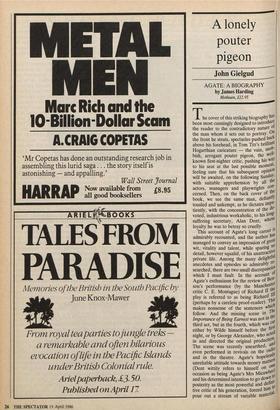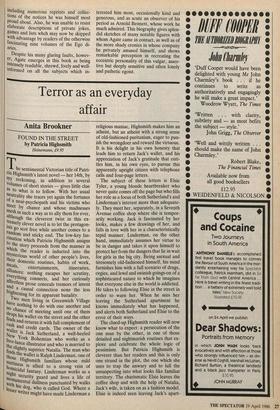A lonely pouter pigeon
John Gielgud
AGATE: A BIOGRAPHY by James Harding
Methuen, £12.95
The cover of this striking biography bas been most cunningly designed to introduce the reader to the contradictory nature Of the man whom it sets out to portray. pn the front he struts, spectacles pushed back above his forehead, in Tom Titt's brilliant Hogarthian caricature — the vain, snob- bish, arrogant pouter pigeon, the well- known first-nighter critic, pushing his we to his seat at the last possible moment, feeling sure that his subsequent opinion will be awaited, on the following Sunday, with suitable apprehension by all the actors, managers and playwrights con- cerned. Then, on the back cover of the book, we see the same man, defiantly tousled and unkempt, as he dictates tiently, with the concentration of the de- voted, industrious workaholic, to his long' suffering secretary, Alan Dent, whose loyalty he was to betray so cruelly. This account of Agate's long career is admirably recounted, and the author has managed to convey an impression of gee!, wit, vitality and talent, while sparing detail, however squalid, of his unattractive private life. Among the many delightful anecdotes and episodes so admirably re- searched, there are two small discrepancies, which I must fault. In the account 0' Agate's enthusiasm for the review of Ben' son's performance (by the Manchester critic C. E. Montague) of Richard II the play is referred to as being Richard 10. (perhaps by a careless proof-reader). This ,, makes nonsense of the sentences which follow. And the missing scene in Me Importance of Being Earnest was not in the, third act, but in the fourth, which was cut either by Wilde himself before the first , night, or by George Alexander, who acted in and directed the original productionci The scene was recently unearthed, an even performed in revivals on the racb° and in the theatre. Agate's hopelessly unreliable attitude towards money ruatte–e (Dent wittily refers to himself on °Ill occasion as being Agate's Mrs Micawberci) and his determined intention to go down t., posterity as the most powerful and define" tive critic of his generation, forced hill? _it' pour out a stream of variable matena' including numerous reprints and collec- tions of the notices he was himself most proud about. Also, he was unable to resist elaborate descriptions of private jokes, games and lists whch may now be skipped with advantage by readers of the otherwise fascinating nine volumes of the Ego di- aries.
Despite his many glaring faults, howev- er, Agate emerges in this book as being intensely readable, shrewd, lively and well- informed on all the subjects which in- terested him most, occasionally kind and generous, and as acute an observer of his period as Arnold Bennett, whose work he much admired. This biography gives splen- did sketches of many notable figures with whom Agate came in contact, as well as of the more shady cronies in whose company he privately amused himself, and shows remarkable perception in recreating the eccentric personality of this vulgar, asser- tive but deeply sensitive and often lonely and pathetic egoist.



















































 Previous page
Previous page